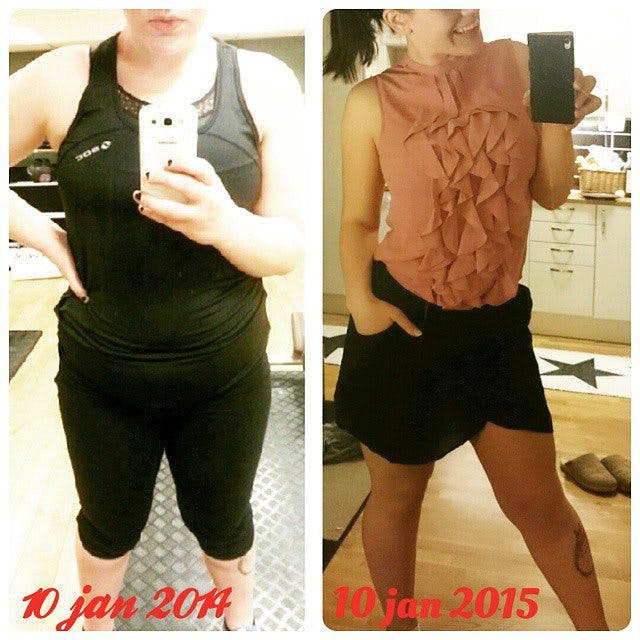“This has to be the easiest weight loss ever”

Before and after
Frida had been more or less overweight her whole life, and the nurse’s advice to eat less and run more sounded easy enough, but it didn’t help. After a while she developed an eating disorder in her quest for weight loss.
Here’s her story about what happened when she recently found what worked for her:
The email
Hi!
Thought I’d brag a little about my weight loss. First I lost a lot of weight, then I got sloppy in the summer/fall, suffered a sugar relapse and gained some back, and now I’ve lost it all again. And then some. This has to be the easiest weight loss ever. No calorie-counting, no weighing of food, no hunger or self-starvation. A lot of energy, and I’m stronger than ever. I’ve broken personal records in ALL exercises at the gym, in the running track, in fact everything I’ve tried. This despite the fact that I used to exercise double the amount when I ate a high-carbohydrate diet, but didn’t come close to where I am now in strength and good shape.
I guess I was born with a good appetite, and have always been a little bigger than the other kids. But as I grew the nurse began to comment on my weight, talked about the My Plate model, and that I should move more and eat less. This sounds so easy, but it wasn’t. I worked hard on food and exercise. Sometimes I exercised several times a day, and sometimes I’d eat nothing, only to go face down in food later just because I was so hungry. It didn’t work. It was almost inhumanely difficult for me to maintain a reasonable weight. As soon as I lost weight, the pounds piled up on me again. Then add the food they served at school and you have a real challenge.
After the nurse had pointed out a million times that I needed to lose X amount of weight, I finally snapped. I tried diet shakes (and everything else in the same category), all kinds of detoxes, lived on fruit and crisp bread. But no, the weight came right back again. Finally it pushed me into an eating disorder where I learned that hunger was my friend. In 9th grade I competed with myself to see how long I could go without eating. The record was 10 days, I think (I agonized if I accidentally swallowed tooth paste). The only thing I ate was fat-burning pills, and I exercised several times a day. When I had to eat, or when I lost it and went face down in candy, I’d stick my fingers down my throat. My entire life revolved around my weight.
When I entered high school I started to eat for emotional reasons. I gave up. “I might as well get fat”, I thought. All other alternatives seemed impossible. I gained 88 lbs (40 kg) in a year, and then I stayed there. I skipped PE (gym class) as I was afraid that people would just stare at my body. Every day, every hour, all I thought about was my body.
LCHF saved me. For the first time in my life I exercise because I want to, not because I want to punish my body. I can eat until satisfied. I don’t do (at least not as often) emotional eating. I eat to give my body what it needs. I’ve never had so much confidence than I have now. It probably saved me from eating myself to death.
Frida Simonsson
Do it yourself
Inspired? Use our low-carb guide or sign up for the free two-week low-carb challenge.
Share your story
Do you have a success story you want to share on this blog? Send your information, plus before and after photos, to success@dietdoctor.com. It would also be greatly appreciated if you shared what you eat in a typical day, whether you fast etc. More information:
Share your story!